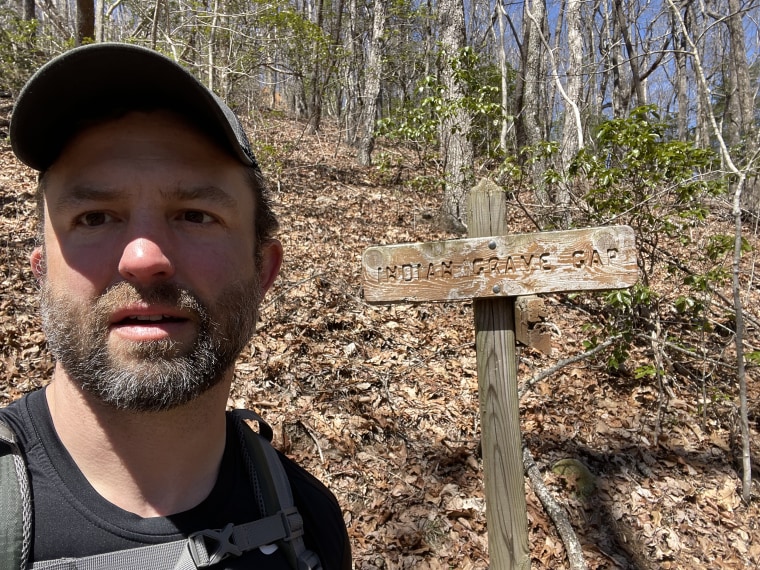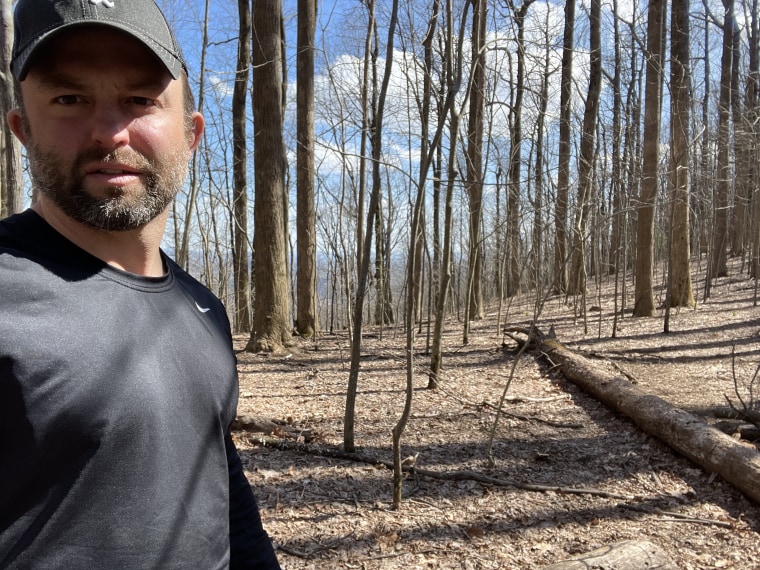Growing up, Nick Gough’s mother, Margie Gough, never revealed to her family that she had Huntington’s disease. Gough and his siblings thought that the personality changes she experienced were just who she was. When she displayed involuntary movements, had seizures or seemed drunk, they wondered if she had Parkinson’s disease. But as her symptoms worsened, the now adult children learned why Margie Gough behaved like she did: She has Huntington’s disease.

“She was trying to protect us so we didn’t know,” Gough, 39, of Mount Sterling, Kentucky, told TODAY. “We didn’t really think anything of it and then as she started to get older, her symptoms got worse.”Gough went for genetic testing and learned that he has the gene for Huntington’s disease. He recently started to walk the Appalachian Trail, even though he has some symptoms, to raise awareness of the disease.
“I just want people to understand what (Huntington’s is),” he said. “It was impacting my family and I just want people to know more about it.”
An overwhelming diagnosis
As Margie Gough aged her behavior seemed more erratic. She swerved while driving and people quite often thought she had a drinking problem.
“People would think she was drunk,” Gough said. “Like she was getting pulled over for impaired driving but she’s sober.”
She experienced chorea, which are awkward, jerky involuntary movements that can be a symptom of several conditions, including Huntington’s disease. Then her seizures worsened. A family friend revealed to Gough and his siblings that Margie Gough had Huntington’s disease.
At the time, Gough was in the military and he worried about undergoing a genetic test to see if he had it. He didn’t know if it would impact his career or even his ability to obtain health insurance. Children with parents who have Huntington’s have a “50/50 chance” of also having the gene that causes it, according to the Huntington’s Disease Society of America. Gough went for anonymous testing and discovered he had the gene.
“It was a shock. It’s rare so you think, ‘What are the odds?’” he recalled. “We got tested because we want to be able to prepare and plan for the future.”

As he was reeling from the results of his genetic test, Margie Gough’s condition deteriorated. She can't leave the house often and experiences outburst and irritability issues. Caretakers help her at home.
“She’s hard to be around,” he said. “We’re all close so we can come check on her, but it is still hard.”
When Gough’s symptoms began appearing he realized he needed to find a different job. As an Army major, he didn’t want his health to impact his work and he underwent medical separation to retire from the military.
“I always thought there was something off with me because I was down. I started feeling apathetic toward a lot of things. I felt like I was developing ADHD. I know that sounds weird,” Gough said. “Then when I found out that we had Huntington’s in the family I started to connect the dots.”
What is Huntington’s disease?
Huntington’s disease is a progressive genetic condition that occurs when a mutation in one gene, huntingtin, causes damage in the brain, according to the Huntington’s Disease Society of America. Huntington’s disease causes people to experience physical, mental and emotional problems. Common symptoms include:
- Chorea, movement or gait problems
- Moodiness, irritability
- Forgetfulness
- Poor judgment and choices
- Speech difficulties, including slurring
- Weight loss
- Problems swallowing

While there is no cure for Huntington’s disease or therapies that stop it from progressing, there are treatments that help people manage some of the symptoms.
Gough takes prescriptions that help with his mood changes and reduces his some of his movement problems, too.
“I am on a medication that helps with my anxiety, depression and apathy and it’s linked to chorea,” he said. “If I take my medication it is really helpful like I’m much more optimistic. I feel more normal. I don’t have as much chorea and it allows me to help out more.”
Hiking the Appalachian Trail
Gough was still in shape from being in the military so he didn’t have to do too much to prepare for the trek. Though since he started hiking, he realized how important having a rest day is to his ability to finish the Appalachian Trail, which runs about 2,200 from Georgia to Maine. He hopes that he’ll be finished with it in six months.
“I’m at it around 8 or 9 and I’m moving until about 4,” Gough said. “I had no idea that the terrain would be so rocky. I knew it was mountainous but I didn’t know it would be so continuously mountainous.”
Realizing that he needed to take breaks was an adjustment he had to make since starting.
“I have to do a pretty good job of resting while I am doing it or I am not going to be able to finish it,” he said.
Though exercise does help lessen the severity of Huntington’s symptoms.
“They find the people who move more they’re just better off later in life,” he said. “That’s one of the reasons I stay active.”

The mental aspect of hiking alone for months on end can feel tough, especially because Gough’s girlfriend Cat, who has cystic fibrosis, is back home. He hopes that people consider donating money to the Huntington’s Disease Society of America to better fund research into treatments and cures. Even though having such a tough condition can be difficult, Gough is grateful that it brought his family together.
“I’m optimistic. I think we’re stronger because of it,” he said. “There’s more acceptance about my mom and her personality now than there was before … She’s got Huntington’s and it’s an illness. It’s not just some weird idiosyncrasies or weird quirk. She’s got a disease that changed her personality.